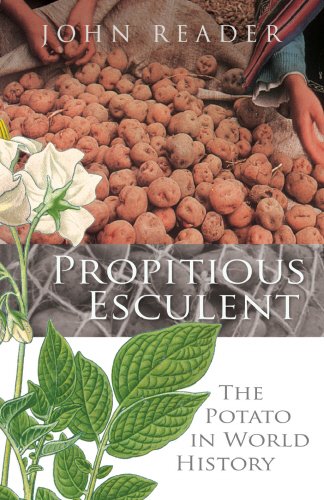Verwandte Artikel zu Propitious Esculent

Inhaltsangabe
From the first nomads travelling down the coast of the Americas nearly 15,000 years ago to the contemporary uses of potato starch in industrialising China, from the gold potatoes at Tiwanaku in Bolivia, the muddy ones in Ireland and those grown in China for MacDonalds chips, via the early days of the Royal Society, Mrs Beeton, Charles Darwin, Vladimir Ilyich Lenin and Chairman Mao to the mapping of the potato genome, the story of the potato is both satisfying and fascinating. Before domestication on the Andean antiplano, the high alkaloid content of potatoes made them poisonous to humans. But since then, these perfectly formed bundles of nutrition - naturally fat free, consisting mainly of energy-giving carbohydrate, but also containing protein, vitamin C and potassium - have been grown safely and cheaply underground in almost any weather and soil conditions, helping to fuel industrial revolution and population explosions.But their efficiency and versatility have also led to over-reliance and tragedy in the face of disease - most devastatingly during the Irish Great Hunger. John Reader follows the thread of the potato's story through the tapestry of human history, from its origins and evolution to its slightly mysterious arrival in Europe, where it became a crucial part of our gastronomic and social fabric. The UN's International Year of the Potato falls in 2008, and as global population swells and famine remains a constant risk, and environmental sustainability becomes ever more crucial, Reader asks what role the spud still has to play. "Propitious Esculent" is a highly readable exploration of the biology, history and social influence of our most humble, adaptable foodstuff.
Die Inhaltsangabe kann sich auf eine andere Ausgabe dieses Titels beziehen.
Über die Autorin bzw. den Autor
John Reader is an author and photojournalist. He holds an Honorary Research Fellowship in the Department of Anthropology at UCL and is a fellow of the Royal Anthropological Institute and the Royal Geographic Society.
Von der hinteren Coverseite
Praise for Cities:
'Probably the most enjoyable book ever written about the matter of a city... Fascinating' Jan Morris, The Times
'Cities is vastly entertaining, and Reader has a fine eye for the telling anecdote and statistic... Reading it is a bit like wandering with an erudite companion through a great city in which the past rubs shoulders with the present and surprises lurk around every corner.' Time
'A fascinating account of how cities grow and sometimes crumble... Reader's magpie eye...picks out gems' Guardian
Aus dem Klappentext
From the first nomads travelling down the coast of the Americas nearly 15,000 years ago to the contemporary uses of potato starch in industrialising China, from the gold potatoes at Tiwanaku in Bolivia, the muddy ones in Ireland and those grown in China for MacDonalds chips, via the early days of the Royal Society, Mrs Beeton, Charles Darwin, Vladimir Ilyich Lenin and Chairman Mao to the mapping of the potato genome, the story of the potato is both satisfying and fascinating.
Before domestication on the Andean antiplano, the high alkaloid content of potatoes made them poisonous to humans. But since then, these perfectly formed bundles of nutrition - naturally fat free, consisting mainly of energy-giving carbohydrate, but also containing protein, vitamin C and potassium - have been grown safely and cheaply underground in almost any weather and soil conditions, helping to fuel industrial revolution and population explosions. But their efficiency and versatility have also led to over-reliance and tragedy in the face of disease - most devastatingly during the Irish Great Hunger.
John Reader follows the thread of the potato s story through the tapestry of human history, from its origins and evolution to its slightly mysterious arrival in Europe, where it became a crucial part of our gastronomic and social fabric. The UN s International Year of the Potato falls in 2008, and as global population swells and famine remains a constant risk, and environmental sustainability becomes ever more crucial, Reader asks what role the spud still has to play. Propitious Esculent is a highly readable exploration of the biology, history and social influence of our most humble, adaptable foodstuff.
„Über diesen Titel“ kann sich auf eine andere Ausgabe dieses Titels beziehen.
Gebraucht kaufen
Zustand: BefriedigendEUR 6,45 für den Versand von Vereinigtes Königreich nach USA
Versandziele, Kosten & DauerSuchergebnisse für Propitious Esculent
Propitious Esculent: The Potato in World History
Anbieter: WorldofBooks, Goring-By-Sea, WS, Vereinigtes Königreich
Hardback. Zustand: Good. The book has been read but remains in clean condition. All pages are intact and the cover is intact. Some minor wear to the spine. Artikel-Nr. GOR005014541
Anzahl: 1 verfügbar
Propitious Esculent
Anbieter: WeBuyBooks, Rossendale, LANCS, Vereinigtes Königreich
Zustand: Good. Most items will be dispatched the same or the next working day. A copy that has been read but remains in clean condition. All of the pages are intact and the cover is intact and the spine may show signs of wear. The book may have minor markings which are not specifically mentioned. Ex library copy with usual stamps & stickers. Artikel-Nr. wbb0023813812
Anzahl: 1 verfügbar
Propitious Esculent
Anbieter: WeBuyBooks, Rossendale, LANCS, Vereinigtes Königreich
Zustand: Like New. Most items will be dispatched the same or the next working day. An apparently unread copy in perfect condition. Dust cover is intact with no nicks or tears. Spine has no signs of creasing. Pages are clean and not marred by notes or folds of any kind. Artikel-Nr. wbs5012806515
Anzahl: 1 verfügbar
Propitious Esculent : The Potato in World History
Anbieter: Better World Books Ltd, Dunfermline, Vereinigtes Königreich
Zustand: Good. Ships from the UK. Former library book; may include library markings. Used book that is in clean, average condition without any missing pages. Artikel-Nr. GRP29642921
Anzahl: 1 verfügbar

